- Home
- News & Features
- News
- FY2019
- Colombia’s aim of building a society in which people with disabilities resulting from conflicts can participate: Connecting the people and society through a change of consciousness
News
January 23, 2020
Colombia’s aim of building a society in which people with disabilities resulting from conflicts can participate: Connecting the people and society through a change of consciousness
In Colombia, domestic conflicts have been continuing for about 50 years. Currently, approximately 8 million people, or 17% of the population, are victims of conflict, and many of them are persons with physical and psychosocial disabilities. Since 2015, JICA has implemented projects to formulate strategies targeting Colombian provinces to create a society in which people with disabilities can participate, regardless of whether they are affected by conflict or not. In the pilot region, JICA has taken a multifaceted approach, including employment, education, medical and health care, mental health care, awareness-raising activities, and leadership development, to lay the foundation for the future Colombian government’s support policy for people with disabilities, including the transformation of consciousness within themselves.
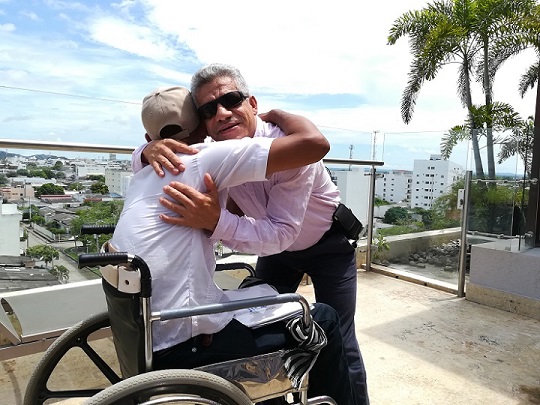 Victims of conflicts with disabilities in Colombia having completed intensive peer counseling courses
Victims of conflicts with disabilities in Colombia having completed intensive peer counseling courses
Creating a social framework while simultaneously providing mental health care
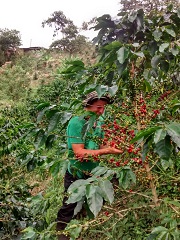 In the field of employment support, we have developed a system for retaining working people with disabilities and have implemented efforts to eliminate prejudices against them. This has resulted in improved income for people with disabilities and the expansion of medical and health services to rural areas, where they did not have the opportunity to leave their homes
In the field of employment support, we have developed a system for retaining working people with disabilities and have implemented efforts to eliminate prejudices against them. This has resulted in improved income for people with disabilities and the expansion of medical and health services to rural areas, where they did not have the opportunity to leave their homes
In Colombia, military and public security-related budgets are extensive, and social security-related budgets are limited. Budgets to support conflict victims are being allocated intensively, but basic pension systems and welfare service systems for people with disabilities, as a whole, have not yet been established. At the time of the project’s commencement, domestic laws had advocated the participation of persons with disabilities in society, but there were many issues to be addressed in order to implement those laws.
JICA’s “Project for Social Inclusion of Conflict Victims with Disabilities” aims to create a society in which persons with disabilities, according to government ordinance, can receive basic employment support, education, medical and health services, as well as engage in group activities to protect their right to participate in society. Between April 2016 and August 2019, we implemented five initiatives in eight cities, including “employment,” “education,” “medical and health care,” “mental health care,” and “training leaders to engage in awareness-raising activities.”
 (left) In the area of support for education, the project developed a system for retaining working people with disabilities and strengthened the system for children with disabilities to attend school. Individual education plans have also been implemented. Employees from the Ministry of Education provided such things as educational training for the staff of provincial education bureaus
(left) In the area of support for education, the project developed a system for retaining working people with disabilities and strengthened the system for children with disabilities to attend school. Individual education plans have also been implemented. Employees from the Ministry of Education provided such things as educational training for the staff of provincial education bureaus
(right) In the field of medical and health information, a system was established to enable people with disabilities to have priority in receiving medical services. We also provided training for healthcare professionals
Peer counseling has changed minds
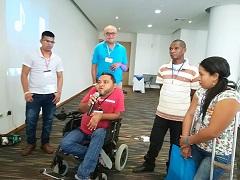 Introduction of peer counseling was highly effective. According to a Colombian government official who managed the training, the attitude towards disabled administrative officials have changed to that of respect
Introduction of peer counseling was highly effective. According to a Colombian government official who managed the training, the attitude towards disabled administrative officials have changed to that of respect
Among the five initiatives, support was provided for the development of peer counselors who provide mental health care, which helped to raise awareness among people with disabilities.
The project invited experts from Costa Rica who had studied Japanese-style peer counseling to provide training and intensive courses to train a total of 72 peer counselors.
“When I asked the administrative officials working together on the project, they said they found conflict victims with disabilities clearly changed through peer counseling. In rural areas, which comprises most of the country of Colombia, people with disabilities often only have contact with their own families, depend on them, and many leave their decision-making to their families. However, the Government of Colombia highly appreciates the adoption of the peer counseling method for the transformation towards opening up the lives and changing the attitudes of people with disabilities,” says JICA Expert Yoko Isobe, who is in charge of the project.
Neftalí Arroyave (blind/landmine-stricken) who received training in peer counseling said that his attitude was one of anger towards his family and others until then. However, after the training, he realized that the causes of his anger were “that he did not accept his impairment” and “it was himself, not the people around him, who looked down on him.” Thanks to the training, he says he is now able to engage positively with others by believing in his own potential.
Furthermore, the leadership development training, which incorporates the peer counselor training program, also contributed to the reform of the mindset. A total of 42 people who graduated from this training program are conducting activities to raise awareness throughout the country. Currently, the Ministry of Interior is taking the lead in implementing this training nationwide.
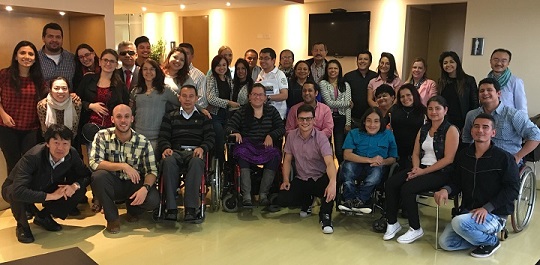 At the leadership development training. It is a long-term course of one year and five months
At the leadership development training. It is a long-term course of one year and five months
A manual summarizing support know-how is being prepared
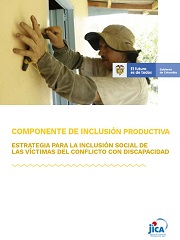 Cover of the manual on “employment”
Cover of the manual on “employment”
The project is currently developing a manual for Colombian government officials based not only on the development of peer counselors and leaders but also on the activities of pilot communities. For the five initiatives that were implemented in the pilot regions, including “employment,” “education,” “medical and health care,” “peer counselor development,” and “leadership development,” their support know-how has been compiled into respective books (a total of six books including the introduction). It is expected that this know-how will be utilized as basic manuals for the development of support activities throughout Colombia going forward.
Also, the Ministry of Interior is taking the lead in establishing disability groups in various regions, and even after the project is over, the promotion of social participation by people with disabilities is planned to spread throughout the country.
“I hope that organizations of persons with disabilities will come together in the future and develop the ability to negotiate with the government as a nationwide organization,” says JICA Expert Isobe with passion.
Related Link
- About JICA
- News & Features
- Countries & Regions
- Our Work
- Thematic Issues
- Types of Assistance
- Partnerships with Other Development Partners
- Climate Change / Environmental and Social Considerations
- Evaluations
- Compliance and Anti-corruption
- Science and Technology Cooperation on Global Issues
- Research
- JICA Development Studies Program / JICA Chair
- Support for the Acceptance of Foreign HRs / Multicultural and Inclusive Community
- Publications
- Investor Relations





